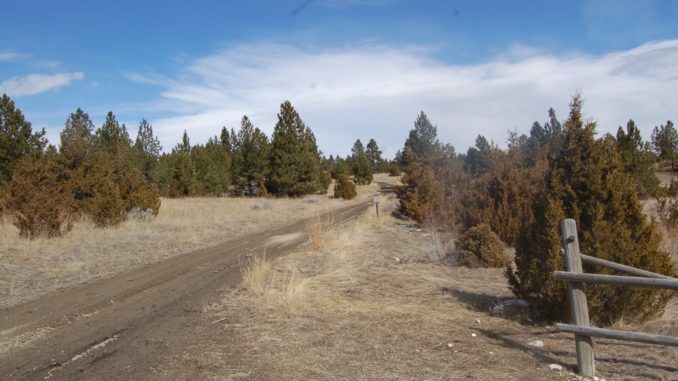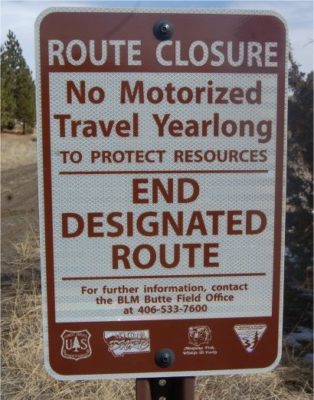
Government Apathy Brings “Road Rage” in Montana
Multiple cases regarding public land and private property rights continue to move through local government administrations. Challenges to all government officials to adhere to the rights of the citizens are front and center here in Montana.
Around the end of the Civil War era, gold was discovered in the mountains of Montana, thus bringing thousands of miners in hopes of finding riches. In the early days of the gold rush, there were multiple levels of commerce that came with the mining and ranching activities.
Jefferson and Meagher Counties were established in the heart of gold country here in Montana. Broadwater County was later created, inheriting its duties from other counties for the people of Broadwater County. The county commissioners were tasked with an increased demand for infrastructure in order to keep up with the demand for supplies. They were also tasked with the administration of access to public land and to protect access to private property. The local infrastructure became the backbone of interstate and intrastate commerce.
County commissioners were faced with resolving legal access issues under the 1866 Mining Act. To meet that challenge, county roads were designated to enhance the development of minerals and the American West. The beneficial use of natural resources was and still is the backbone of industry in America. Incremental loss of access to those resources is where we are today.
 In Montana, there are two ways the use of a county road by the public can be amended. Established county roads can be either “Abandoned” or “Closed.” In the case of abandonment, a formal legal proceeding must be followed to “Abandon” a county road in question. That action eliminates all public use of that county road by order of the local elected officials.
In Montana, there are two ways the use of a county road by the public can be amended. Established county roads can be either “Abandoned” or “Closed.” In the case of abandonment, a formal legal proceeding must be followed to “Abandon” a county road in question. That action eliminates all public use of that county road by order of the local elected officials.
A formal legal proceeding is also required to “Close” a county road. In a county road closure, the road continues to be part of the public transportation inventory but is no longer publicly used by order of the local elected officials. Usually a gate or barrier is established to close the road. In some cases a sign is posted reading “Road Closed”.
With the Missouri River running right through the middle of Broadwater County, officials were tasked with a new challenge as a result of the creation of Canyon Ferry Lake. Eminent domain was used to acquire land that then became submerged under Canyon Ferry Lake. That action rendered original highways and county roads unusable as a result of the flooding of the lake. Because of this, sections of county roads that were part of that infrastructure of the road system were “Closed.”
Joe Schmaus and his family own property in what is known as the “Spokane Hills,” overlooking Canyon Ferry Lake near Townsend, Montana. Access to this land was established through the development of roads and trails in the early development of Jefferson County. In the mid 1940’s and 1950’s, government officials, through petition and eminent domain proceedings, closed portions of those roads historically used to cross the Missouri River. Many of these roads provided access to private property.
The “Red Hill Road,” historically a main arterial road, provided public access between Helena, Montana and the ferry crossing prior to the creation of the lake. In that transportation infrastructure, the Daniothy and Lefler county roads were adopted by the county. These connector routes provided access to private property and navigated terrain for transportation of goods to other destinations. The Daniothy and the Lefler roads were eventually closed by petition but were never “abandoned.”
In 2017, Mr. Schmaus came to the Broadwater County Commission with an official request to open closed roads historically used to access his private property. The commissioners, through a formal proceeding, reviewed historic records and found recorded documents showing county officials did “Close” all of these roads. Mr. Schmaus brought forward facts he presented to the commission showing that the roads in question were never “Abandoned.”
The Commission held an official meeting where they determined that another landowner in the area would be negatively impacted if they were to officially reopen Lefler Road. The commissioners subsequently met with officials of the United States Forest Service, Bureau of Reclamation, Bureau of Land Management and Montana Fish Wildlife & Parks. They then toured the area to map and reopen one of the historic county roads. It was decided that opening the Daniothy road that intersects with other roads would have the least impact on the local rancher and his property. The commissioners however failed to take any action on opening any of the roads.
Broadwater County Commissioners have not made a decision regarding the case to open any of the roads that were petitioned in the original case, as of this date. According to Mr. Schmaus, the commission continues to neglect their duty, which then resulted in an order by a judge on March 17th, 2020. The judge in the case determined that his court did not have legal ability to rule on a pleading from a local rancher seeking standing in the case.
Citizens concerned with the continued loss of access to public land have also filed a petition with Broadwater County Commissioners to open the roads that provide access to thousands of acres of public land. This petition brings forward the fact that access to public land has been locked away for more than 50 years and should be reopened. Mr. Schmaus stated that the public right to access public land is important and these roads are part of the right to own and enjoy private property in Montana.
In 2019, Broadwater County Attorney Cory Swanson researched historic county roads in the Elkhorn Mountains. These roads were never “abandoned” or “closed” by the local government. However, roads that access private and public land have been closed by the United States Forest Service, which is unlawful. The Elkhorn Mountain range is one of the more heavily used recreation areas as it was designated as a wildlife management unit by the USFS. County roads that are legally established that provide access to public land cannot be closed legally. ~Montana Law
A similar legal challenge is also ongoing in Ravalli County where private property rights are being ignored. Jay Bugli has been seeking formal action from Ravalli County Commissioners for the past couple of years, as reported on in the Redoubt News in December, 2019 (Hughes Creek Road.) Mr. Bugli has also faced problems when elected officials failed to follow the law and provide a resolution to a county road in question. In that case, the legal wrangling in private vs. public use hits head on. Montana Attorney General Tim Fox is also being pushed to step in to protect the constitutional rights of citizens. Mr. Bugli, who is also waiting for local government officials to do their jobs, is frustrated.
The opportunity to join the effort to get the local government on track regarding county roads in Broadwater County can be done by contacting them through email: commissioners@co.broadwater.mt.us
[youtube https://www.youtube.com/watch?v=WAFcZUBVGtI]
Don Bradway contributed to this article.
The views, opinions, or positions expressed by the authors and those providing comments are theirs alone, and do not necessarily reflect the views, opinions, positions of Redoubt News. Social Media, including Facebook, has greatly diminished distribution of our content to our readers’ newsfeeds and is instead promoting Main Stream Media sources. This is called ‘Shadow-banning’. Please take a moment and consider sharing this article with your friends and family. Thank you. Please support our coverage of your rights. Donate here: paypal.me/RedoubtNews





